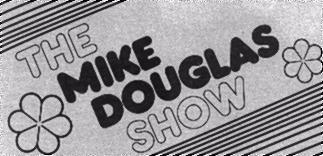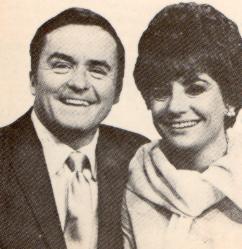|
|
|
 However, he was
still the hometown fellow at heart to his audience. While
the move to Burbank provided a more accessible guest
roster, a portion of the charm of The Mike Douglas
Show was lost. The daily afternoon visits began to
look similar to every other talk offering in syndication,
with the exception of Phil Donahue. The Mike-Merv-Dinah
race just had different home bases (Mike at NBC Burbank,
Merv at the Hollywood Palace and Dinah at CBS Television
City). While Mike still had a loyal following and led
in most of his markets, the Mike in Hollywood shows
somehow didn't have the same fit as Cleveland and
Philadelphia.
However, he was
still the hometown fellow at heart to his audience. While
the move to Burbank provided a more accessible guest
roster, a portion of the charm of The Mike Douglas
Show was lost. The daily afternoon visits began to
look similar to every other talk offering in syndication,
with the exception of Phil Donahue. The Mike-Merv-Dinah
race just had different home bases (Mike at NBC Burbank,
Merv at the Hollywood Palace and Dinah at CBS Television
City). While Mike still had a loyal following and led
in most of his markets, the Mike in Hollywood shows
somehow didn't have the same fit as Cleveland and
Philadelphia. In February 1980, the shocking news was delivered:
The Mike Douglas Show would be canceled in September
1980, to be replaced by The John Davidson Show,
an attempt at a younger, hipper afternoon audience
(notwithstanding the fact Davidson had failed in three
attempts at summer variety shows on NBC and ABC). The
news was devastating to Mike on two accounts: one, his
perceived disloyalty from Group W (in Vicki Lawrence's
autobiography, she recounts a conversation at the time
of her battles with Group W over her '90s talk show and
Roseanne recounted to Vicki how Group W was the company
which did in Mike Douglas, a long-time favorite of both
comediennes); and two, his anger at Davidson---a friend
whom Mike had showcased frequently during the '60s and '70s and
whom had co-hosted the Douglas show on at least two
occasions.
In February 1980, the shocking news was delivered:
The Mike Douglas Show would be canceled in September
1980, to be replaced by The John Davidson Show,
an attempt at a younger, hipper afternoon audience
(notwithstanding the fact Davidson had failed in three
attempts at summer variety shows on NBC and ABC). The
news was devastating to Mike on two accounts: one, his
perceived disloyalty from Group W (in Vicki Lawrence's
autobiography, she recounts a conversation at the time
of her battles with Group W over her '90s talk show and
Roseanne recounted to Vicki how Group W was the company
which did in Mike Douglas, a long-time favorite of both
comediennes); and two, his anger at Davidson---a friend
whom Mike had showcased frequently during the '60s and '70s and
whom had co-hosted the Douglas show on at least two
occasions.| Mike Frontpage | Mike 2 | Mike 3 | Mike 5 | Epilog | FAQ | Guestbook |